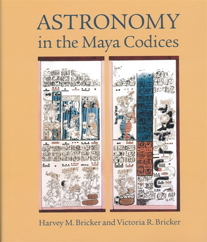You are here
2013 Osterbrock Book Prize Winner - Harvey and Victoria Bricker
Harvey and Victoria Bricker Awarded the 2013 Donald E. Osterbrock Book Prize for Astronomy in the Maya Codices
by Jarita C. Holbrook

 The Donald E. Osterbrock Book Prize of the Historical Astronomy Division of the American Astronomical Society will be awarded in 2013 to Harvey M. Bricker and Victoria R. Bricker for Astronomy in the Maya Codices (Philadelphia: American Philosophical Society, 2011). The prize is for "the author(s) of the book judged to best advance the field of the history of astronomy or to bring history of astronomy to light."
The Donald E. Osterbrock Book Prize of the Historical Astronomy Division of the American Astronomical Society will be awarded in 2013 to Harvey M. Bricker and Victoria R. Bricker for Astronomy in the Maya Codices (Philadelphia: American Philosophical Society, 2011). The prize is for "the author(s) of the book judged to best advance the field of the history of astronomy or to bring history of astronomy to light."
The conquest of the new world saw the destruction of nearly all of the written works of the Maya of Central and North America. Fortunately for the historians of astronomy, four works survived that provide a window into Mayan astronomy: the Dresden Codex, the Grolier Codex, the Madrid Codex, and the Paris Codex. Astronomy in the Maya Codices brings together in one volume everything that is known about astronomy in the Codices. The Brickers have an impressive publication history on the astronomy found in the Dresden Codex, the Madrid Codex, and in some Mayan throne inscriptions. This volume far surpasses these earlier works.
 The existence of the Codices and the fact that they contain astronomical knowledge is not new. What the Brickers have done is bring together in one volume everything that is known about the Codices and they have gone on to explore all elements of astronomy contained within them and other Mayan materials.
The existence of the Codices and the fact that they contain astronomical knowledge is not new. What the Brickers have done is bring together in one volume everything that is known about the Codices and they have gone on to explore all elements of astronomy contained within them and other Mayan materials.
The culmination of thirty years of collaborative research, this volume presents the Mayan glyphs, the calendar and counting system, the planetary cycles and their correlates to the Mayan agricultural cycle, eclipses and more. The Brickers do not limit themselves by only focusing on the four major Codices; they include information from the other remaining Codices, from engravings on stone monuments and artwork, and from Mayan myths and legends, while continually engaging with the research done by previous scholars as well as our modern understanding of the night sky. The Brickers have been thorough and exact in their research. They have created a definitive volume that will please experts on the Maya as well as historians of astronomy.
Harvey Bricker and Victoria Bricker are professors emeriti at Tulane University and are also courtesy professors of anthropology and research associates of the Florida Museum of Natural History at the University of Florida. Victoria Bricker earned her PhD in Anthropology from Harvard. She has published consistently on the Mayan people. Her commencement into the astronomy of the Maya began with a study of the eclipse tables found in the Dresden Codex in the early 1980s. Harvey Bricker earned his PhD in Anthropology from Harvard as well. His career includes studies of Paleolithic man through archaeological sites in France. He began collaborating with Victoria Bricker on the Maya astronomy materials in the 1980s. This volume contains all of their scientific findings from their previous works on the astronomy of the Maya as well as their analyses of other scholars' findings and their new findings about the remaining Codices.
This volume is ideal for teaching a section if not an entire class on Mayan astronomy because it requires no other text or articles: it is all here.
More on Harvey and Victoria Bricker
Harvey M. Bricker is an archaeologist who received his BA in history from Hamilton College and his MA and PhD in anthropology from Harvard University. His early research was in French Palaeolithic archaeology. He was associated for many years with the excavation and analysis of a prehistoric rockshelter at Les Eyzies, in the Périgord region of southwestern France, and he directed the excavations of a late Neanderthal site in the French foothills of the Pyrénées. Since the early 1980s he has been collaborating with Victoria R. Bricker in a program of research on Maya archaeoastronomy, a program that has resulted in numerous articles and, most recently, a co-authored book, Astronomy in the Maya Codices, published by the American Philosophical Society. Bricker was elected a Fellow of the American Association for the Advancement of Science in 1985 "for contributions to paleoarchaeology in France and to the archaeoastronomy of the Maya," and in 1987 he was named "Chevalier dans l'Ordre des Palmes Académiques" by the government of France "pour services rendus à la culture française" ("for services to French culture"). He is Emeritus Professor of Anthropology at Tulane University and Courtesy Professor of Anthropology and Research Associate of the Florida Museum of Natural History at the University of Florida.
Victoria R. Bricker is a cultural anthropologist who received her BA in philosophy from Stanford University and her MA and PhD in anthropology from Harvard University. Her fieldwork in Mexico includes several years with the Tzotzil-Maya Indians of highland Chiapas, first investigating their ritual humor, followed by oral history and archival research on Colonial and Postcolonial revitalization movements in Chiapas, Yucatan, and highland Guatemala. Since 1971, she has carried out research on the Maya language of Yucatan, including ethnobotanical research for a Maya-English dictionary. In 1978, she began to study the language of Maya hieroglyphs, later focusing on astronomy in the Precolumbian Maya codices, in collaboration with Harvey M. Bricker. She was elected to membership in the National Academy of Sciences in 1991 and to the American Philosophical Society in 2002. She is Emeritus Professor of Anthropology at Tulane University and Courtesy Professor of Anthropology and Research Associate of the Florida Museum of Natural History at the University of Florida.
